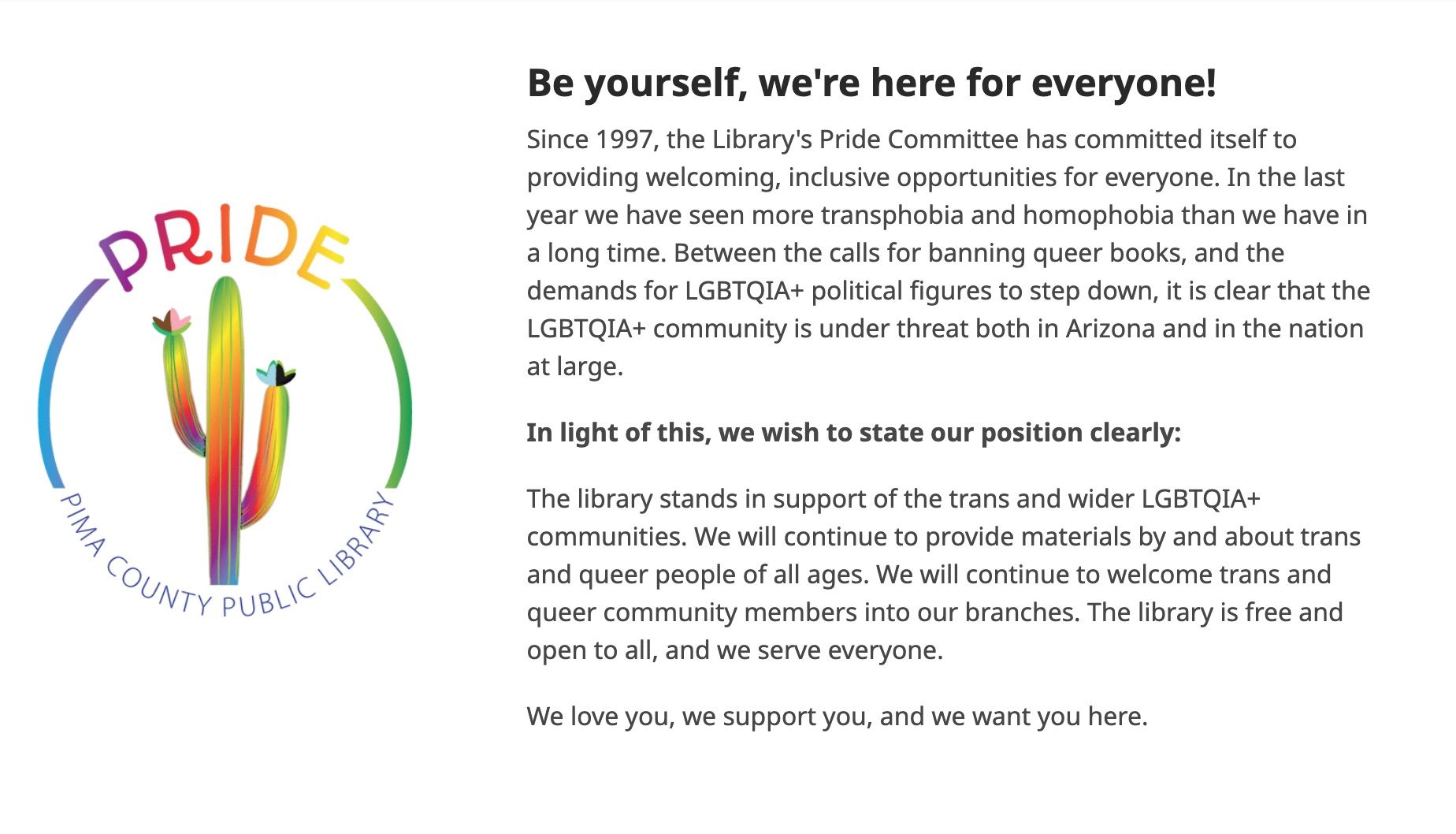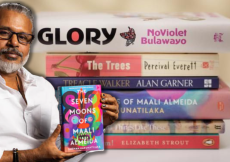Kelly is a former librarian and a long-time blogger at STACKED. She’s the editor/author of (DON’T) CALL ME CRAZY: 33 VOICES START THE CONVERSATION ABOUT MENTAL HEALTH and the editor/author of HERE WE ARE: FEMINISM FOR THE REAL WORLD. Her next book, BODY TALK, will publish in Fall 2020. Follow her on Instagram @heykellyjensen.
View All posts by Kelly Jensen
Kelly is a former librarian and a long-time blogger at STACKED. She’s the editor/author of (DON’T) CALL ME CRAZY: 33 VOICES START THE CONVERSATION ABOUT MENTAL HEALTH and the editor/author of HERE WE ARE: FEMINISM FOR THE REAL WORLD. Her next book, BODY TALK, will publish in Fall 2020. Follow her on Instagram @heykellyjensen.
View All posts by Kelly Jensen
Kelly is a former librarian and a long-time blogger at STACKED. She’s the editor/author of (DON’T) CALL ME CRAZY: 33 VOICES START THE CONVERSATION ABOUT MENTAL HEALTH and the editor/author of HERE WE ARE: FEMINISM FOR THE REAL WORLD. Her next book, BODY TALK, will publish in Fall 2020. Follow her on Instagram @heykellyjensen.
View All posts by Kelly Jensen
Kelly is a former librarian and a long-time blogger at STACKED. She’s the editor/author of (DON’T) CALL ME CRAZY: 33 VOICES START THE CONVERSATION ABOUT MENTAL HEALTH and the editor/author of HERE WE ARE: FEMINISM FOR THE REAL WORLD. Her next book, BODY TALK, will publish in Fall 2020. Follow her on Instagram @heykellyjensen.
View All posts by Kelly Jensen
Kelly is a former librarian and a long-time blogger at STACKED. She’s the editor/author of (DON’T) CALL ME CRAZY: 33 VOICES START THE CONVERSATION ABOUT MENTAL HEALTH and the editor/author of HERE WE ARE: FEMINISM FOR THE REAL WORLD. Her next book, BODY TALK, will publish in Fall 2020. Follow her on Instagram @heykellyjensen.
View All posts by Kelly Jensen
Kelly is a former librarian and a long-time blogger at STACKED. She’s the editor/author of (DON’T) CALL ME CRAZY: 33 VOICES START THE CONVERSATION ABOUT MENTAL HEALTH and the editor/author of HERE WE ARE: FEMINISM FOR THE REAL WORLD. Her next book, BODY TALK, will publish in Fall 2020. Follow her on Instagram @heykellyjensen.
View All posts by Kelly Jensen
Kelly is a former librarian and a long-time blogger at STACKED. She’s the editor/author of (DON’T) CALL ME CRAZY: 33 VOICES START THE CONVERSATION ABOUT MENTAL HEALTH and the editor/author of HERE WE ARE: FEMINISM FOR THE REAL WORLD. Her next book, BODY TALK, will publish in Fall 2020. Follow her on Instagram @heykellyjensen.
View All posts by Kelly Jensen
Kelly is a former librarian and a long-time blogger at STACKED. She’s the editor/author of (DON’T) CALL ME CRAZY: 33 VOICES START THE CONVERSATION ABOUT MENTAL HEALTH and the editor/author of HERE WE ARE: FEMINISM FOR THE REAL WORLD. Her next book, BODY TALK, will publish in Fall 2020. Follow her on Instagram @heykellyjensen.
View All posts by Kelly Jensen
Kelly is a former librarian and a long-time blogger at STACKED. She’s the editor/author of (DON’T) CALL ME CRAZY: 33 VOICES START THE CONVERSATION ABOUT MENTAL HEALTH and the editor/author of HERE WE ARE: FEMINISM FOR THE REAL WORLD. Her next book, BODY TALK, will publish in Fall 2020. Follow her on Instagram @heykellyjensen.
View All posts by Kelly Jensen
Kelly is a former librarian and a long-time blogger at STACKED. She’s the editor/author of (DON’T) CALL ME CRAZY: 33 VOICES START THE CONVERSATION ABOUT MENTAL HEALTH and the editor/author of HERE WE ARE: FEMINISM FOR THE REAL WORLD. Her next book, BODY TALK, will publish in Fall 2020. Follow her on Instagram @heykellyjensen.
View All posts by Kelly Jensen
Kelly is a former librarian and a long-time blogger at STACKED. She’s the editor/author of (DON’T) CALL ME CRAZY: 33 VOICES START THE CONVERSATION ABOUT MENTAL HEALTH and the editor/author of HERE WE ARE: FEMINISM FOR THE REAL WORLD. Her next book, BODY TALK, will publish in Fall 2020. Follow her on Instagram @heykellyjensen.
View All posts by Kelly Jensen
Kelly is a former librarian and a long-time blogger at STACKED. She’s the editor/author of (DON’T) CALL ME CRAZY: 33 VOICES START THE CONVERSATION ABOUT MENTAL HEALTH and the editor/author of HERE WE ARE: FEMINISM FOR THE REAL WORLD. Her next book, BODY TALK, will publish in Fall 2020. Follow her on Instagram @heykellyjensen.
View All posts by Kelly Jensen
Kelly is a former librarian and a long-time blogger at STACKED. She’s the editor/author of (DON’T) CALL ME CRAZY: 33 VOICES START THE CONVERSATION ABOUT MENTAL HEALTH and the editor/author of HERE WE ARE: FEMINISM FOR THE REAL WORLD. Her next book, BODY TALK, will publish in Fall 2020. Follow her on Instagram @heykellyjensen.
View All posts by Kelly Jensen
Kelly is a former librarian and a long-time blogger at STACKED. She’s the editor/author of (DON’T) CALL ME CRAZY: 33 VOICES START THE CONVERSATION ABOUT MENTAL HEALTH and the editor/author of HERE WE ARE: FEMINISM FOR THE REAL WORLD. Her next book, BODY TALK, will publish in Fall 2020. Follow her on Instagram @heykellyjensen.
View All posts by Kelly Jensen
Kelly is a former librarian and a long-time blogger at STACKED. She’s the editor/author of (DON’T) CALL ME CRAZY: 33 VOICES START THE CONVERSATION ABOUT MENTAL HEALTH and the editor/author of HERE WE ARE: FEMINISM FOR THE REAL WORLD. Her next book, BODY TALK, will publish in Fall 2020. Follow her on Instagram @heykellyjensen.
View All posts by Kelly Jensen
Kelly is a former librarian and a long-time blogger at STACKED. She’s the editor/author of (DON’T) CALL ME CRAZY: 33 VOICES START THE CONVERSATION ABOUT MENTAL HEALTH and the editor/author of HERE WE ARE: FEMINISM FOR THE REAL WORLD. Her next book, BODY TALK, will publish in Fall 2020. Follow her on Instagram @heykellyjensen.
View All posts by Kelly Jensen
Kelly is a former librarian and a long-time blogger at STACKED. She’s the editor/author of (DON’T) CALL ME CRAZY: 33 VOICES START THE CONVERSATION ABOUT MENTAL HEALTH and the editor/author of HERE WE ARE: FEMINISM FOR THE REAL WORLD. Her next book, BODY TALK, will publish in Fall 2020. Follow her on Instagram @heykellyjensen.
View All posts by Kelly Jensen
Kelly is a former librarian and a long-time blogger at STACKED. She’s the editor/author of (DON’T) CALL ME CRAZY: 33 VOICES START THE CONVERSATION ABOUT MENTAL HEALTH and the editor/author of HERE WE ARE: FEMINISM FOR THE REAL WORLD. Her next book, BODY TALK, will publish in Fall 2020. Follow her on Instagram @heykellyjensen.
View All posts by Kelly Jensen
Kelly is a former librarian and a long-time blogger at STACKED. She’s the editor/author of (DON’T) CALL ME CRAZY: 33 VOICES START THE CONVERSATION ABOUT MENTAL HEALTH and the editor/author of HERE WE ARE: FEMINISM FOR THE REAL WORLD. Her next book, BODY TALK, will publish in Fall 2020. Follow her on Instagram @heykellyjensen.
View All posts by Kelly Jensen
Banned Books Week is less than one month away, but for those of us who’ve been engaged in the anti-censorship movement over the last several years, it’s far from the only time to highlight and emphasize the growing power of book banners. Although it draws attention to the reality of censorship in America, ultimately, Banned Books Week — all capitals — is a marketing campaign. Whether or not it empowers the everyday person to engage in anti-censorship efforts the other 51 weeks of the year is hard to say.
Although Banned Books Week can be as annoying as it is important, it can and should be reframed as an opportunity to revisit library policies and procedures to ensure that the First Amendment Rights of every individual within a community are being considered, addressed, and honored. Build those good banned book displays and provide information to users about how to push back against ongoing censorship, but also turn the lens inward toward your own institutions to ensure you’re living the values expressed over the course of the week.
This applies whether you work in a library or are a library user. You have the power to speak up and help codify the rights of all to see and be seen within the library, its programs, its books, and all of its services.
Libraries of all stripes — public, school, and academic — should have strong policies around how they build their collections, the types of materials they include, where and how items are removed (generally following the MUSTIE guidelines), and where and how people can challenge those materials/ask for reconsideration of their inclusion (hereafter referred to collectively as “collection policies”). Not all libraries put this information directly on their websites, though that is good practice, but it should be available to patrons if they ask to see it. Libraries who do not make these available on their websites might want to consider the implications of that choice. Many of those demanding book bans do so under the guise of libraries trying to hide an agenda, but by making those policies and forms readily accessible, book banners can’t as easily fall onto that belief. Be as transparent as possible.
Though there are numerous examples of robust collection policies out there to help in modeling and strengthening current policies — or developing them if none exist — one element missing from even some of the best policies is one that deserves to be included: the explicit naming of identities and beliefs protected under those policies. Too few policies state that their collection policies are crafted with the belief that people of LGBTQ+ identities, of varying abilities, of a range of racial and cultural backgrounds, all ages, and an array of religious beliefs are at the heart of the decisions made about the materials acquired for the library. Simply stating “all people” feels inclusive, of course, but without explicitly naming who “all people” two things can happen.
First, it’s a loophole for book banners who can say that they themselves represent all people within a community, even if they do not. Second, naming those identities is the window so many people need from their libraries. This isn’t just for patrons. It’s for staff, too, who too often are overlooked in these book bans and who are unfortunately bearing the brunt of both the challenges of materials in their collections and for being part of those very identities being deemed “smut” or “pornographic.”
Making this change in collection policies to acknowledge groups that are the target of discrimination is small, but the payoff and reward potential is immense.

The Pima County Public Library in Arizona offers an annual proclamation during Pride month that explicitly states their responsibility to LGBTQ+ people in their community. It’s prominent on their website, and it includes the library’s commitment to offering LGBTQ+ focused material. There are also several great resources available at and beyond the libraries themselves to help those in the queer community.
Although their collection policies do not explicitly state their commitment to LGBTQ+ people, it does note that “The Pima County Public Library serves a diverse and dynamic population. Pima County’s population is composed of every age group and multiple socio-economic and cultural/ethnic demographics. PCPL is committed to supporting of the reading, recreational, listening and viewing options for the entire community.” Because they already offer an annual proclamation, it would be worthwhile to clearly identify some of those diverse population groups in the policy, including their LGBTQ+ community. This would take an already strong policy and set of practices to the next level, codifying the commitment to their diverse community.
Prince George’s County Memorial Library System in Maryland does something similar. They offer an annual proclamation and landing page for Pride Month, noting their commitment to serving LGBTQ+ people. Their collection policies, too, emphasize that they acquire materials that support the entire community: “In support of its mission, the Library selects, maintains and provides access to information, services and materials in a variety of formats to fulfill the educational, informational, recreational and cultural needs of all people of Prince George’s County.”
A small update to name the identities included under “all” would take the otherwise excellent policy to the next level.
In support of Pride month this year, Rochester Public Library in Minnesota saw its own board offer a proclamation of support for the queer community, noting that with increased censorship and banning of materials by and about queer people, such vocalization was crucial. The library’s collection policies have not yet been updated with this specific language, though they do note their commitment to meeting the needs of the whole community.
Language around inclusion is frequently already in policies that govern a school or library, but its broadness in collection policies — “all” or “diverse” voices/community members — is worth updating. Reiterate the values and the communities that deserve to be seen and heard right in the policies and do so with specificity. The library collects books that represent the range of races, cultures, genders, sexualities, religions, ages, and abilities within your community. The library purchases materials reflecting the community’s identities, including people who are LGBTQ+, BIPOC, disabled, religious, and all ages.
Being explicit in the collection development policy is another tool in combating book bans, as you leave nothing to the imagination of those seeking to impose their singular worldview on an entire community.
Being explicit in the collection development policy also aids in crafting powerful proclamations like those linked above and in developing book displays/reader advisory tools all year long, encompassing as wide a range of experiences as possible about and for those in your community. Not only can you quickly pull from your policy for Pride, but you can do so for Hispanic Heritage Month, Black History Month, Asian American Pacific Islander Heritage Month, National Arab American Heritage Month, Disability Pride Month, Mental Health Awareness Month, the High Holidays, Holy Week, Holi, and more.
Patrons can ask for this kind of language at board meetings, just as much as library workers can speak up for it within their institution. If it’s fear of what the library board might think of such a change, reframe that fear: how might it feel for a queer teenager, seeing that books about them are being banned from libraries across the country and that entire libraries may close due to inclusion of LGBTQ+ titles, to see their library’s employees speaking up on their behalf? It’s worth the shaky voice and sweaty palms. The worst thing that happens is that the conversation is shut down, in and of itself a reminder of why we need to care about who sits on school and library boards. Why we need to advocate for getting those committed to an entire community and not just their special interests and political agendas seated on these governing bodies.
At the end of the day, we know none of this is about books. It’s about people. This kind of update to collection policies shifts the policy from one about materials to one about the people represented by and depicted within them.
Libraries are not neutral. Libraries are non-partisan. Spelling it out helps articulate this crucial difference.
Book Censorship News: September 8, 2023
Due to the holiday, this week’s roundup is shorter than usual.
- Launching this week’s roundup with a powerful comic from the most banned author in America, Maia Kobabe. Eir comic is about being the target of nonstop censorship.
- ABC News talks about the ongoing push from states and libraries to withdraw from the American Library Association. None of the libraries or states doing this should be surprising since they’ve all been candid about their intentions to do so.
- A look at the reality of book banning in New Jersey. In Oregon, the last year has brought the most book challenges since 1992 (when Focus on the Family went on its tear). There’s also an update on Wisconsin.
- One of the founders of Moms For Liberty just got appointed to the Florida State Ethics Commission.
- “‘The illustrations are meant for ‘our oldest students,’ said Smith, a Democrat on the board seeking reelection. But the PAC ‘has done more to expose younger students to age-inappropriate material with this mailing than hundreds of library books could ever have done.’” In Central Bucks, Pennsylvania, the far-right has mailed images from Kobabe’s Gender Queer to 17,000 households to elicit votes. It’s going to be a very ugly election season.
- One Darien, Connecticut school board member thought himself the one who could create school policies and wrote one that would pull challenged books off shelves for up to 6 months. The rest of the board was not happy.
- Here’s a letter to the editor that is in response to a different letter to the editor. I don’t like to point to book banner pieces, but this is one you should read to understand how right-wing crisis actors lure people into their thinking. This has all of the nonsense about child trafficking that we know is categorically untrue — take something that is a real concern so there’s a nugget of fact but then make it so expansive it sounds like a crisis when it really is not. (Colorado).
- And here’s one that somehow manages to get all of the right-wing buzzwords into it: all about the potential ban on The Absolutely True Diary of a Part-Time Indian from East Noble School District (IN).
- New Hanover County Schools (NC) have banned the use of Stamped in the classroom, though it will remain in the school library.
- Little Miami School District (OH) has parents demanding a process to determine which books are allowed to be sold at the Scholastic Book Fairs. This is over being angry because Heartstopper was available. So, allowing other people to purchase books is not cool, I guess. But it’s not a book ban, etc.
- In Davie County, North Carolina, Flamer is missing from the public library shelves. Who did it seems like a “mystery.”
- The Coronado Library (CA) is still hearing from the book crisis actors about how there should not be LGBTQ+ books in the library. This battle began in June. A similar thing is happening in Clovis Library in the same state. Fortunately, the Clovis Library will be doing nothing with this nonsense.
- If you’re thinking “but California,” here’s your reminder it doesn’t matter the color of the state. Indeed, there’s a mega-church behind the push to the right in California.
- I’ll be curious how the enjoining of the Texas READER Act impacts the libraries that are going full throttle in book banning and censorship. Seems like even if it’s public libraries doing it, there’s a lawsuit waiting to happen.
- Alabama’s governor is lodging threats to Prattville’s Foley Library over the rhetoric of inappropriate books in the library. Nonsense begetting nonsense from political “leaders.”
- But the Prattville library will not be moving or removing the books.
- “More than 46,000 books in the Elizabethtown Area School District’s four libraries are being reviewed and rated following an update to the district’s policy on library materials.” No, that’s a real story. This school district in Pennsylvania has mandated book ratings on every book.
- There is now a lawsuit hoping to end the potential closure of Dayton Memorial Library (WA).
- Now that Campbell County Public Library (WY) has fired its director since she wouldn’t ban books, the board now doesn’t know what to do with book challenges.
- “Due to the new rules imposed by Missouri Secretary of State Jay Ashcroft in May, the Washington Public Library and Scenic Regional Library had to draft new language for minors’ cards, stating the staff are not responsible for monitoring children’s access to reading materials, both physical and virtual. The libraries then had to ‘expire’ cards of patrons ages 17 and under, and the cards could only be reinstated once a parent or legal guardian signed the new policy.” I really hope these policies, which are now impacting everyone — not just the intended targets — start getting the average person to give a shit about what’s happening in their legislature.
- Mayfield High (NM) received a challenge to Jack of Hearts (And Other Parts), and the person behind it is, of course, right-wing.
- We are now up to three states implementing PragerU materials into classroom lessons — the right-wing platform deals in misinformation, so it tracks that the three states, Florida, Texas, and Oklahoma, have found it to be fitting, given their legislature.
- Marshalltown School District (IA) has 20 books they’ll be removing to comply with Moms For Liberty’s the new law in the state.
- Hoboken, New Jersey, will declare itself a book sanctuary city.
- A small group of morality police want to remove or place in a restricted area the manga available at Garfield County Libraries (CO).
- A Florida JCC canceled an upcoming event with a Jewish author over the potential that the speaker may talk about slavery and racism. This is the state environment there. It’s also called censorship.
- Apparently, The Scarlet Letter was pulled from Cobb County Schools (GA) due to “lack of interest.” This entire story is about a library fulfilling its purpose of supporting curriculum and hyped up as some book banning spree — the same district DID indeed remove books and an educator because of bigotry, but I don’t think this story is that. Sometimes, classics are removed from school libraries because they are so readily available and, in this case, in the public domain, so available legally and freely online.
- Meanwhile, in Fulton County Schools (GA), the following books were just banned: Flamer, Blankets, Me and Earl and the Dying Girl, and Gender Queer.
- Something odd is going on at the Berkeley County School District (SC). There is apparently not a list of books to be banned in the district, but also there might be.
- 34 books were pulled from Indian River Schools (FL). Policies be damned.
- Earlier this week, I covered the ongoing saga at Samuels Public Library (VA) and the reality it might close October 1 over withholding of funds. The meeting this week with the county commissioners is summarized here and here.
- How To Alert Your School Board to Right-Wing Bad Actors: Book Censorship News, September 1, 2023
- Library Bomb Threats Continue to Increase: Book Censorship News, August 25, 2023
- Districts Are Turning to AI to Ban Books: Book Censorship News, August 18, 2023
- Age-Restricted Library Cards Aren’t a Solution. They’re a Liability: Book Censorship News, July 28, 2023
- How To Own A News Cycle: Book Censorship News, July 21, 2023
- Book Censorship News: July 14, 2023
- The Most Banned Books in the U.S. Are Not New Books: Book Censorship News, July 7, 2023
- A Censorship Language Primer: Book Censorship News, June 30, 2023
- 70 Years of the Library Bill of Rights: Book Censorship News, June 23, 2023



























:quality(85):upscale()/2023/05/11/976/n/1922564/782262e2645d6b967847b4.74342194_.png)








